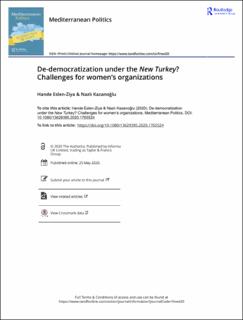| dc.contributor.author | Eslen Ziya, Hande | |
| dc.contributor.author | Kazanoglu, Nazli | |
| dc.date.accessioned | 2023-01-10T13:34:00Z | |
| dc.date.available | 2023-01-10T13:34:00Z | |
| dc.date.created | 2020-05-26T07:43:10Z | |
| dc.date.issued | 2020 | |
| dc.identifier.citation | Eslen-Ziya, H., & Kazanoğlu, N. (2022). De-democratization under the New Turkey? Challenges for women’s organizations. Mediterranean Politics, 27(1), 101-122. | en_US |
| dc.identifier.issn | 1362-9395 | |
| dc.identifier.uri | https://hdl.handle.net/11250/3042396 | |
| dc.description.abstract | This article is an endeavour to explore the changing networking strategies of
women’s non-governmental organizations (NGOs) in Turkey over the last dec-
ade. We delineate the shifts and changes during what we call the de-
democratization process where secular women’s organizations face significant
constraints and difficulties while networking and lobbying the government.
Under these constrained conditions, yet, secular women’s organizations make
an exceptional effort to sustaining their lobbying activities and changing their
networking strategies as well as partners. Relying on the related literature and
26 semi-structured in-depth interviews conducted with activist members of
these organizations with about a 15-year time difference, this paper contends
that Turkish women’s organizations under the New Turkey are forced to find
alternative allies and adjust their velvet triangles of support. Though their
strategies were similar in some ways, the type of partnerships formed and
who these partners are changed from the first and second decade of the
2000s. Thus, the paper shows how the secular women’s organizations adapt
to new resources as they mobilize and how they shift away from employing the
single target approach to double while changing their initial networking and
collaboration partners. | en_US |
| dc.language.iso | eng | en_US |
| dc.publisher | Taylor & Francis | en_US |
| dc.rights | Navngivelse 4.0 Internasjonal | * |
| dc.rights.uri | http://creativecommons.org/licenses/by/4.0/deed.no | * |
| dc.title | De-democratization under the New Turkey? Challenges for women’s organizations | en_US |
| dc.type | Peer reviewed | en_US |
| dc.type | Journal article | en_US |
| dc.description.version | publishedVersion | en_US |
| dc.rights.holder | The authors | en_US |
| dc.subject.nsi | VDP::Samfunnsvitenskap: 200::Statsvitenskap og organisasjonsteori: 240 | en_US |
| dc.source.pagenumber | 101-122 | en_US |
| dc.source.volume | 27 | en_US |
| dc.source.journal | Mediterranean Politics | en_US |
| dc.source.issue | 1 | en_US |
| dc.identifier.doi | 10.1080/13629395.2020.1765524 | |
| dc.identifier.cristin | 1812560 | |
| dc.relation.project | Universitetet i Stavanger: IN-12337 | en_US |
| cristin.ispublished | true | |
| cristin.fulltext | original | |
| cristin.fulltext | original | |
| cristin.qualitycode | 1 | |

